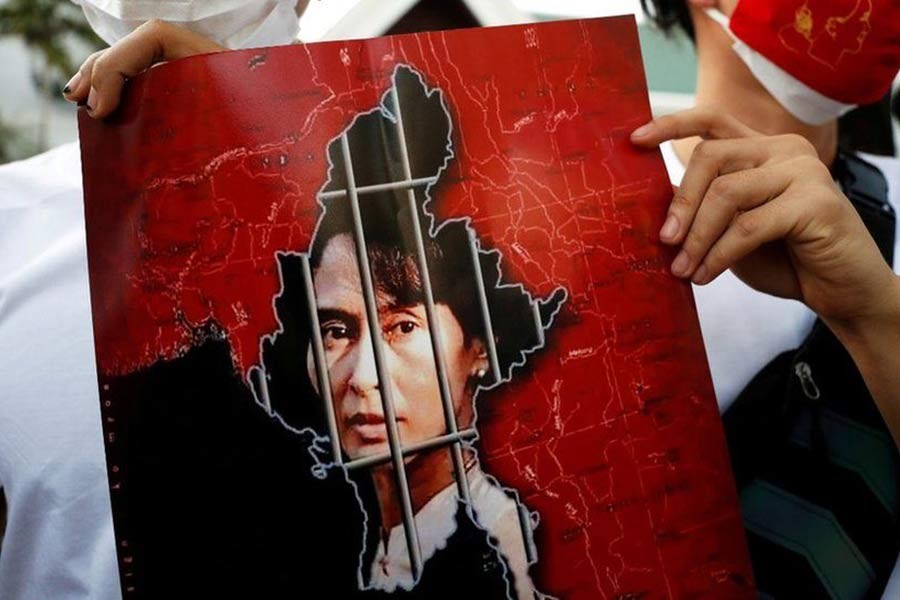Police in Myanmar have filed several charges against the detained civilian leader Aung San Suu Kyi following Monday's military coup.
The charges include breaching import and export laws, and possession of unlawful communication devices.
She has been remanded in custody until 15 February, police documents show.
Her whereabouts are still unclear, but it has been reported that she is being held at her residence in the capital, Nay Pyi Taw.
Deposed President Win Myint has also been charged, the documents show - in his case with violating rules banning gatherings during the Covid pandemic. He has also been remanded in custody for two weeks.
Neither the president nor Ms Suu Kyi have been heard from since the military seized power in the early hours of 1 February.
The coup, led by armed forces chief Min Aung Hlaing, has seen the installation of an 11-member junta which is ruling under a year-long state of emergency.
The military sought to justify its action by alleging fraud in last November's elections, which Ms Suu Kyi's National League for Democracy (NLD) won decisively.
What are the details of the charges?
The accusations are contained in a police document submitted to a court.
It alleges that Ms Suu Kyi illegally imported and used communications equipment - walkie-talkies - found at her home in Nay Pyi Taw.
She was remanded in custody "to question witnesses, request evidence and seeks legal counsel after questioning the defendant", the document says.
Mr Win Myint is accused, under the National Disaster Management Law, of meeting supporters in a motorcade during the election campaign.
What opposition is there to the coup?
Activists in Myanmar are calling for civil disobedience.
Many hospital medics are either stopping work or continuing but wearing symbols of defiance in simmering anger over the suppression of Myanmar's short-lived democracy.
Protesting medical staff say they are pushing for the release of Ms Suu Kyi.
They are wearing red, or black, ribbons and pictured giving the three-fingered salute familiar from the Hunger Games movies and used by demonstrators last year in Thailand.
Online, many changed their social media profile pictures to one of just the colour red.
"The civil disobedience is one of the tactics that the young people in Myanmar are now launching a campaign across the whole country," Yangon Youth Network founder Thinzar Shunlei told the BBC.
"They're calling for action especially from the civil servants, to stop working for the government, for the military junta."
A Facebook group has been set up to co-ordinate the disobedience campaign.
But there have been few signs of major protest. On Tuesday night, drivers honked their horns in the main city, Yangon, and residents banged cooking pots.
Myanmar has been mainly calm following the coup, with troops on patrol and a night-time curfew in force.
There have also been demonstrations in support of the military - one attracted 3,000 people, AP news agency reports.
How are other countries reacting to the coup?
The Group of Seven major economic powers said it was "deeply concerned" and called for the return of democracy.
"We call upon the military to immediately end the state of emergency, restore power to the democratically-elected government, to release all those unjustly detained and to respect human rights," the statement released in London said. The G7 comprises Canada, France, Germany, Italy, Japan, the UK and the US.
But efforts at the UN Security Council to reach a common position came to nought as China failed to agree. China is one of five permanent members with a right of veto in the council - the UN body responsible for maintaining peace.
China has been warning since the coup that sanctions or international pressure would only make things worse in Myanmar.
Beijing has long played a role in protecting the country from international scrutiny. It sees the country as economically important and is one of Myanmar's closest allies.
Alongside Russia, it has repeatedly protected Myanmar from criticism at the UN over the military crackdown on the Muslim minority Rohingya population.


